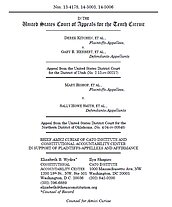Learn more about Cato’s Amicus Briefs Program.
Utah Constitutional Amendment 3, passed by referendum in 2004, states that no union other than one between a man and a woman may be recognized as a marriage. Derek Kitchen and five co-plaintiffs took issue with this definition and filed a lawsuit in federal district court last year to challenge the gay marriage ban. In a surprising and widely publicized December 2013 ruling, the court invalidated the amendment, finding that such a restriction was an affront to equal protection and the fundamental right to marry. Meanwhile, Mary Bishop and Sharon Baldwin also filed a federal suit to challenge a similar provision that was added to Oklahoma’s constitution by referendum in 2004. Like Utah’s district court, the Oklahoma district court found the amendment unconstitutional. Following on the heels of last term’s Supreme Court ruling in United States v. Windsor—which struck down part of the Defense of Marriage Act—these ground-breaking red-state cases are now both before the U.S. Court of Appeals for the Tenth Circuit, which will consider the constitutionality of a state’s decision to exclude same-sex unions from the definition of marriage. Reprising our collaboration in Perry v. Hollingsworth—the Prop 8 case in which the Supreme Court avoided ruling on the merits—Cato and the Constitutional Accountability Center have filed a brief supporting the Utah and Oklahoma plaintiffs’ fight for equality under the law in their respective challenges. We argue that the Equal Protection Clause of the Fourteenth Amendment was intended to protect from this same type of arbitrary and invidious singling-out that the Utah and Oklahoma marriage restrictions effect; that the original meaning of the Equal Protection Clause confirms that its protections are to be interpreted broadly; and that the clause provides every person the equal right to marry a person of his or her choice. We believe that the Utah and Oklahoma constitutional amendments conflict with the equal protection rights of those same-sex couples whose unions are treated differently than those of opposite-sex couples. Every person has the right to choose whom to marry, and to have that decision respected equally by the state in which they live. Especially in the wake of Windsor, it is becoming clearer that laws like these that force same-sex unions into second-class status have no place in a free society. The Tenth Circuit should affirm the district courts’ decisions.

This work is licensed under a Creative Commons Attribution-NonCommercial-ShareAlike 4.0 International License.


